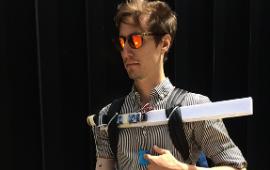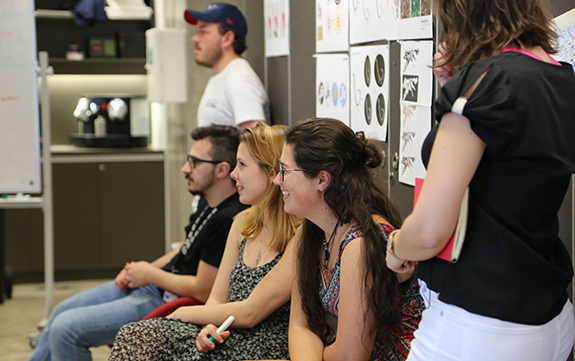Biometric backpacks record human health at sugar+

In Summary
- Swinburne design students workshopped and prototyped new applications for technologies developed by global industry partners
Swinburne School of Design students across design, engineering, business and health joined forces with students from St Gallen University, Switzerland and Porto Polytechnic, Portugal in the sugar+ event at Design Factory Melbourne.
Over 10 days, students workshopped and prototyped new applications for technologies developed by global industry partners, Merck, Hella Ventures and Sonae MC - Modelo Continente.
“It’s amazing to see so many people coming together in Melbourne to work on real projects that will make a difference in real people’s lives,” says John Eggleston, International Research and Development Projects, Design Factory Melbourne.

Students workshopped and prototyped new applications for technologies that will make real-life impact.
The sugar network facilitates sugar+ events worldwide, originating from Stanford University, hosting 30 projects in an academic year. Collaborating university students in the network are challenged to rethink and create fresh solutions to real world problems using user-centred design innovation processes.
A new partner in the sugar network, Merck, recently released Mavenclad a drug for the treatment of relapsing-remitting multiple sclerosis. The drug can reduce the frequency of clinical exacerbations of the disease and delay the progression of disability.
Mavenclad’s development inspired Merck to investigate a patient-centred approach, looking at ways to provide extra support to the patient and monitor the drug’s efficacy.
By collecting and monitoring biometric information such as heart rate and responses detectable on the surface of the skin, Design Factory students are working with people living with MS patients in exploring new methods for relapse prediction.
The students and MS patients worked together to test a backpack with embedded sensors that collects biometric data, and trialled a new digital service, designed to incentivise patients to supply data about their symptoms.
Students also researched and workshopped new applications for the Structural Health And Knock Emission (SHAKE) sensor by Hella Ventures. SHAKE is a sensitive piezoelectric-based-device that picks up vibrations and provides diagnostic information about the operation of machinery - from trucks to elevator cables.
With SHAKE making it possible to make any flat surface a touch enabled surface, students investigated exciting new applications for low-cost advertising displays, and the transportation of fresh produce and wine.
Supermarket giant, Sonae MC - Modelo Continente is focused on creating new customer experiences in supermarkets. Students were challenged to come up with ideas and solutions to make it easier for customers to complete their supermarket experience, starting with the realisation that they’ve run out of milk.
Student concepts ranged from camera systems in refrigerators and pantries that detect and identify missing items, to inflatable trolleys that minimise customer injury and property damage, including to parked cars.
“Industry engaged innovation projects through Design Factory Melbourne are frequently brought to commercial reality, and these projects are on track to enter the European and US markets in 2019. The final hurdle with these students will be the international trade show EXPE hosted at Stanford University in June with prototype demonstrations on display to Venture Capitalists of Silicon Valley,” explains Mr Eggleston.
For more information contact John Eggleston.

